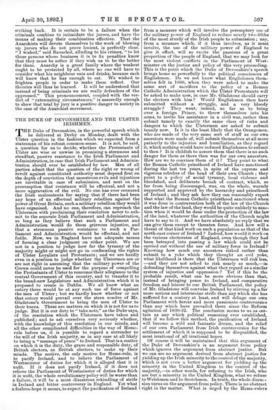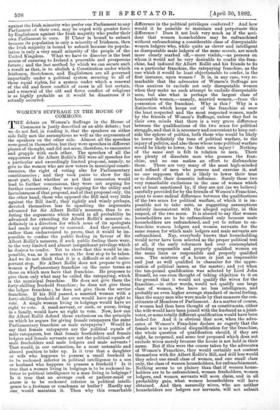THE DUKE OF DEVONSHIRE AND THE ULSTER IRISHMEN. T HE Duke
of. Devonshire, in the powerful speech which he delivered at Derby on Monday, dealt with the Ulster question in the fashion which we expected from a statesman of his robust common-sense. It is not, he said, a question for us to decide, whether the Protestants of Ulster are wise or unwise in promising a strenuous and steadfast, passive resistance to the Irish Parliament and Administration, in case that Irish Parliament and Adminis- tration should ever be established by law. Men of all parties admit that the question of the right or wrong of revolt against constituted authority must depend first on the depth of conviction that monstrous evils and injustices are inevitable in case of submission, and next on the presumption that resistance will be effectual, and not a mere aggravation of the evil. No one has ever censured the Irish malcontents for saying that if there had been any hope of an effectual military rebellion against the power of Great Britain, such a military rebellion they would have organised. And no one, therefore, can reproach the Ulstermen with proclaiming their resolution never to sub- mit to the separate Irish Parliament and Administration, so long as they believe that such a Parliament and Administration would do them grievous injustice, and that a strenuous passive resistance to such a Par- liament and Administration would be effectual, and not futile. Now, we in England have not adequate means of forming a clear judgment on either point. We are not in a position to judge how far the tyranny of the majority might or might not go in confiscating the rights of Ulster Loyalists and Protestants ; and we are hardly even in a position to judge whether the Ulstermen are or are not right in assuming that the military power of the Crown could never be used for the purpose of compelling the Protestants of Ulster to renounce their allegiance to the central Government of this country, and to transfer it to the brand-new Legislature and Administration which it is proposed to create in Dublin. We all know what an outcry there would be at any such use of force against the men of Ulster ; but we hardly know whether or not that outcry would prevail over the stern resolve of Mr. Gladstone's Government to bring the men of Ulster to their knees. These are matters on which it is not for us to judge. But it is our duty, to " take note," as the Duke says, of the resolution which the Ulstermen have taken and published ; and to ask ourselves very seriously whether, with the knowledge of this resolution in our minds, and all the other complicated difficulties in the way of Home- rule before us, it is possible to regard a surrender to the will of the Irish majority, as in any case at all likely to bring a "message of peace" to Ireland. That is a matter on which it is the duty, the grave and responsible duty, of British electors, as British electors, to make up their minds. The motive, the only motive for Home-rule, is to pacify Ireland, and to relieve the Parliament of Westminster of duties for which it is alleged that it is unfit. If it does not pacify Ireland, if it does not relieve the Parliament of Westminster of duties for which it is unfit, the whole revolutionary policy will be worse than a failure, it will be a most disastrous rekindling of strife in Ireland. and bitter controversy in England. Yet what a forlorn-hope it seems, to expect the pacification of Ireland from a measure which will involve the peremptory use of the military power of England to reduce nearly two-fifths of the most sturdy of the Irish people to submission ; nay, from a measure which, if it thus involves, as it must involve, the use of the military power of England to give it effect, will so excite the passions of a great proportion of the people of England, that we may look for the most violent conflicts in the Parliament of West- minster on the justice and policy of this very proceeding. This is the point which the Duke of Devonshire's speech brings home so powerfully to the political consciences of Englishmen. Do we not know what Englishmen them- selves felt in 1688, when they were asked to make the same sort of sacrifices to the policy of a Roman Catholic Administration which the Ulster Protestants will be asked to make now, in case Mr. Gladstone should carry the electors with him ? Would Englishmen then have submitted without a struggle, and a very bloody struggle ? They went, indeed, so far as to bring over a foreign Prince, to throw themselves into his arms, to invite his assistance in a civil war, rather than submit tamely to exactly the same class of risks and dangers to which the Ulstermen are asked to submit tamely now. Is it in the least likely that the Orangemen, who are made of the very same sort of stuff as our own ancestors were made of, will submit themselves at all more patiently to the injustice and humiliation, as they regard it, which nothing would have induced Englishmen to submit to then ? It is childish to assure them that there is no such danger for them as there then was for our own ancestors.
How are we to convince them of it ? They point to what the Roman Catholic priesthood of Ireland have sanctioned during the last ten years, in spite of the express and vigorous rebukes of the head of their own Church ; they point to a policy of social tyranny, local violence and bloodshed, and deliberate breach of contract, which, so far from being discouraged, was, on the whole, warmly supported and approved by the hierarchy and priesthood of Ireland ; and they ask how they can reasonably expect that what the Roman Catholic priesthood sanctioned when it was done in contravention both of the law of the Church and the law of the land, they would be quite unlikely to sanc- tion when it would be done under the protection of the law of the land, whatever the authorities of the Church might have to say to it. And we have absolutely no reply that we can give them except to threaten force. And how will a threat of that kind work on such a population as that of the north-east corner of Ireland ? Indeed, how would it work on the various electorates of England, even though they had been betrayed into passing a law which could not be carried out without the use of military force in Ireland? Knowing how much our ancestors risked rather than submit to a yoke which they thought an evil yoke, what likelihood is there that the Ulstermen will risk less, —and they are not asked to risk nearly as much,—ia defending themselves against what they regard as a similar system of injustice and oppression ? Yet if this be the probable result, what can be more obvious than that, instead of bringing peace to Ireland, and comparative freedom and leisure to our British Parliament, the policy of Mr. Gladstone will convulse Ireland by stirring up a far more serious and internecine strife than any which she has suffered for a century at least, and will deluge our own Parliament with fiercer and more passionate controversies than any which have prevailed there since the Reform agitation of 1830-32. The conclusion seems to us as cer- tain as any which political reasoning ever established, that if we follow this method, the pacification of Ireland. will become a wild and fantastic dream, and the relief of our own Parliament from Irish controversies for the settlement of which it is supposed to be disqualified, the most irrational of all irrational hopes.
Of course it will be maintained that this argument of the Duke of Devonshire's is an argument from policy which ignores the argument from abstract justice. But we can see no argument derived from abstract justice for yielding up the Irish minority to the control of the majority, which is not even a better argument for yielding up the minority in the United. Kingdom to the control of the majority,—in other words, for refusing to the Irish, who are but a minority in the United Kingdom, what we refuse to Welshmen and to Scotchmen. In truth, the whole discus- sion turns on the argument from policy. There is no abstract right in the matter. What is urged by the Home-rulers against the Irish minority who prefer our. Parliament to any Parliament of their own, may be urged with greater force by Englishmen against the Irish majority who prefer their own Parliament to ours. If Ulster is bound to submit because its population is only a minority of Irishmen, then the Irish majority is bound to submit because its popula- lation is only a very small minority of the people of the United Kingdom. What we have to discover is the best means of ensuring to Ireland a peaceable and prosperous future ; and the last method by which we can secure such a result as that, is to abolish a Constitution under which Irishmen, Scotchmen, and Englishmen are all governed impartially under a political system securing to all of them equal rights, for a system under which a renewal of the old and fierce conflict of races is all but certain, and a renewal of the old and fierce conflict of religions is as highly probable as it would be disastrous if it actually occurred.



















































 Previous page
Previous page